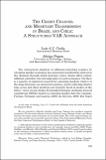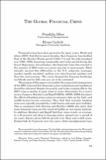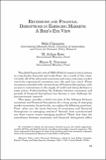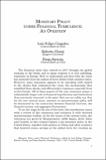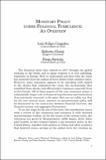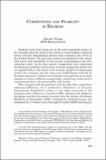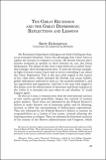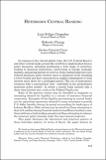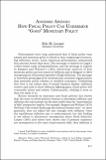Buscar
Mostrando ítems 1-10 de 13
The credit channel and monetary transmission in Brazil and Chile: a structured VAR approach
The widespread adoption of inflation-targeting regimes by emerging market economies has generated considerable interest in the channels through which monetary policy shocks affect output inflation and other relevant aggregates in such economies. Yet there is a paucity of empirical research for emerging ...
The global financial crisis
Financial crises have been pervasive for many years. Bordo and others (2001) find that in recent decades their frequency has doubled that of the Bretton Woods period (1945–71) and the gold standard era (1880–1993) becoming comparable only to the period during the Great Depression. Nevertheless the ...
Recessions and financial disruptions in emerging markets: a bird's eye view
The global financial crisis of 2008–09 led to massive interruptions in cross-border financial and trade flows. As a result of the crisis virtually all of the advanced economies and many emerging market countries experienced recessions over the past two years. These recessions coincided with various ...
Monetary policy under financial turbulence: an overview
The financial crisis that started in 2007 brought the global economy to the brink and in many respects it is still unfolding especially in Europe. How to understand and deal with the crisis has naturally been the subject of fierce debates that continue today. However some consensus appears to be ...
Monetary policy under financial turbulence
The financial crisis that started in 2007 brought the global economy to the brink, and in many respects it is still unfolding, especially in Europe. While a fierce debate continues on how to understand and deal with the crisis, a consensus is emerging with regard to the originating shocks, the mechanisms ...
Competition and stability in banking
Banking went from being one of the most regulated sectors in the economy after the crisis in the 1930s to a more lightly regulated sector with the liberalization process that started in the 1970s in the United States. The previous period was marked by few crises with much more instability in the second ...
The great recession and the great depression: reflections and lessons
My Economics Department colleagues are fond of telling me that as an economic historian I have the advantage that I don’t have to update my lectures in response to events. My history lectures don’t become outdated as quickly as their lectures on say the Great Moderation. The fallacy of this view is ...
Inflation targeting in financially stable economies: has it been flexible enough?
The international financial crisis and Great Recession of 2008- 09 called for a range of significant policy measures by central banks beyond aggressive interest rate cuts. Measures have ranged from improving international coordination to purchasing local private loan portfolios and direct intervention ...
Heterodox central banking
In response to the current global crisis the U.S. Federal Reserve and other central banks around the world have implemented diverse policy measures including purchasing a wide range of securities lending to financial institutions intervening in foreign exchange markets and paying interest on reserves. ...
Anchors aweigh: how fiscal policy can undermine 'good' monetary policy
Policymakers have long understood that if fiscal policy runs amuck and monetary policy is forced to raise seigniorage revenues big inflations result. Latin American policymakers understand this outcome better than most. This message is implicit in Cagan’s (1956) initial study of hyperinflation and the ...

